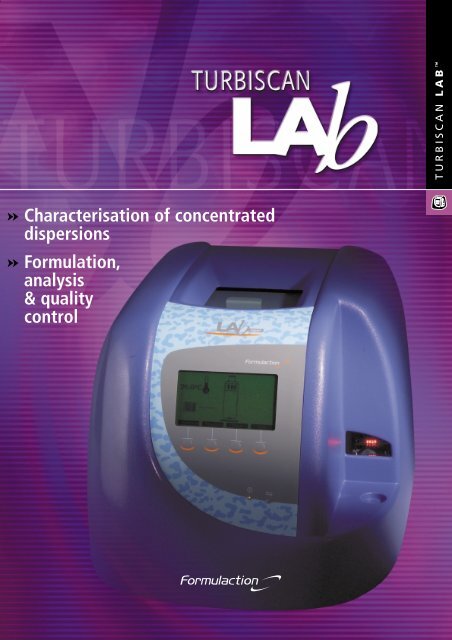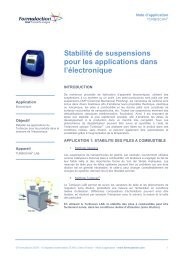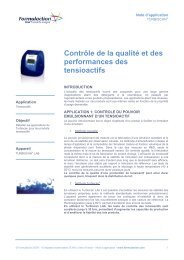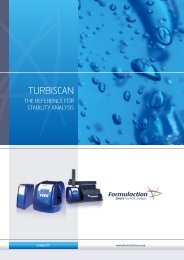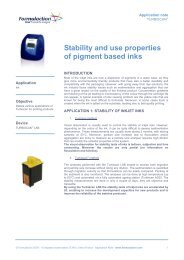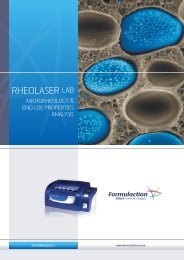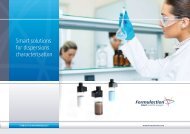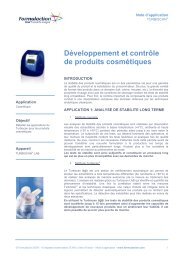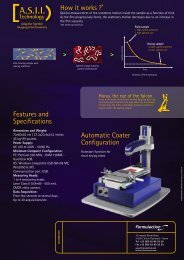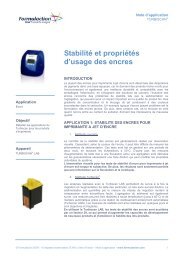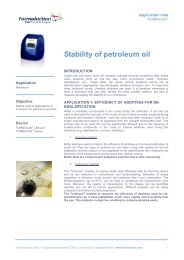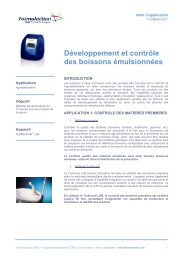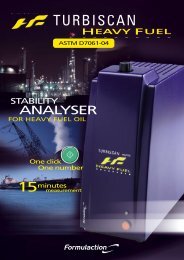TurbiScan Lab brochu.. - Iesmat
TurbiScan Lab brochu.. - Iesmat
TurbiScan Lab brochu.. - Iesmat
You also want an ePaper? Increase the reach of your titles
YUMPU automatically turns print PDFs into web optimized ePapers that Google loves.
Characterisation of concentrated<br />
dispersions<br />
Formulation,<br />
analysis<br />
& quality<br />
control<br />
TURBISCAN LAB
In order to achieve a complete<br />
understanding of “industrial”<br />
systems, the physical<br />
parameters of the concentrated<br />
suspensions and emulsions have to<br />
be measured. Working at process<br />
concentrations is essential for the<br />
analysis to fully reflect naturally<br />
occurring particle / droplet<br />
interactions. The <strong>TurbiScan</strong> LAb<br />
range uses multiple light scattering,<br />
to take up the measurement<br />
challenge of concentrated systems<br />
without dilution.<br />
Multiple light scattering offers the<br />
following advantages :<br />
• Measurement of physical<br />
parameters in up to 95% v/v<br />
concentrated systems (for<br />
emulsions) and over a wide size<br />
range from 0.05 µm to 1 mm<br />
• Measurement of the photon mean<br />
free path (λ) and transport mean<br />
free path (λ*), absolute<br />
parameters which describe the<br />
real state of dispersions,<br />
without any mathematical<br />
approximation<br />
• Calculation of mean particle<br />
diameter or volume fraction<br />
• Non-destructive technique<br />
• No sample preparation.<br />
T R A N S M I S S I O N<br />
B A C K S C A T T E R I N G<br />
TURBISCAN LAB <br />
CORRECT & IMPROVE<br />
FORMULATIONS<br />
WITH AN EFFECTIVE FORMULATION TOOL<br />
To fulfil new product development<br />
specifications in terms of quality, cost and<br />
time, formulators need a reliable and<br />
effective tool to quickly eliminate “bad”<br />
formulations, correct non-optimised ones<br />
and accurately document “good” ones.<br />
The <strong>TurbiScan</strong> LAb range quickly detects and<br />
determines the destabilisation phenomena in<br />
order to correct formulations, shorten and<br />
document ageing tests. Thus, particle size<br />
variations due to coalescence or flocculation<br />
are monitored and can be visualised through<br />
“easy to plot” kinetics of particle Mean<br />
Diameter versus time. Particle migration leading<br />
to sedimentation or creaming phenomena can<br />
be seen through direct calculation of the<br />
Migration Velocity, or of the sediment / cream<br />
Phase Thickness. These results are got 20 to 50<br />
times quicker than a visual subjective and<br />
non-discriminative detection.<br />
Moreover, dispersions stability can be analysed<br />
under usual & normalized conditions of<br />
tests thanks to the temperature controlled<br />
measurement unit.<br />
HOW IT WORKS<br />
The <strong>TurbiScan</strong> LAb reading head consists in a pulsed near infrared light source<br />
(880 nm) and two synchronous detectors. The transmission detector receives the<br />
light flux transmitted (T) through the product, the backscattering detector measures<br />
the light backscattered (BS) by the product (135°). The reading head acquires<br />
transmission and backscattering data either at a chosen position on the sample cell,<br />
or every 40 µm while moving along the 55 mm cell height.
ANALYSE DISPERSIONS<br />
WITH AN ACCURATE CHARACTERISATION TOOL<br />
For a fine knowledge of industrial colloidal<br />
systems, testing laboratories need precise<br />
and quick characterisation tools.<br />
The <strong>TurbiScan</strong> LAb Expert associates the<br />
measurement at one point with the conversion of<br />
sample optical characteristics into physical parameters:<br />
λ* (photon transport mean free path), d (mean<br />
diameter), φ (volume fraction), S (specific surface), l (mean<br />
distance between particles). These parameters describing the<br />
dispersion real state can be monitored to check whether the<br />
products meet the physical specifications.<br />
EASY SAMPLING<br />
AND PRESERVATION<br />
OF THE TUBES<br />
The <strong>TurbiScan</strong> LAb Range works<br />
with disposable, flat bottomed,<br />
glass tubes (diameter : 27.5 mm,<br />
height : 70 mm). Whatever their<br />
viscosity, products are easy to<br />
sample and can be kept for long<br />
term storage or thrown away after<br />
<strong>TurbiScan</strong> LAb analysis. The tubes<br />
are resistant to temperatures up<br />
to 100°C, to centrifugation up to<br />
2000 G, and can be autoclaved.<br />
CONTROL DISPERSIONS<br />
WITH A QUICK QUALITY CONTROL TOOL<br />
The quality of dispersions can be checked and quantified during the manufacturing<br />
process or on the finished product. These verifications must be reliable & traceable to<br />
fulfil quality control requirements.<br />
The <strong>TurbiScan</strong> LAb range offers the ability to perform measurement at a fixed chosen position on the<br />
tube to get a quick and reliable fingerprint of the product to be analysed. It enables quality control of<br />
concentrated dispersions through the instantaneous and reproducible measurement of BS<br />
(backscattering) or T (transmission) describing the dispersion state (in term of particle diameter and<br />
concentration). Comparison of the tested product with a reference sample can be completed in just a<br />
few seconds during or at the end of the manufacturing process.<br />
AUTOMATIC TUBE<br />
RECOGNITION<br />
The <strong>TurbiScan</strong> LAb range comes<br />
complete with an integral Bar<br />
Code Reader which will recognise<br />
a tube (if it has been tested<br />
before), and will open the<br />
corresponding result file. This<br />
automatic tube recognition will<br />
allow reliable management of<br />
samples, during long term ageing<br />
tests or following a product<br />
through a quality control test<br />
regime.<br />
BENEFITS<br />
THE OBJECTIVE<br />
EVALUATION OF<br />
COLLOIDAL SYSTEMS<br />
TO IDENTIFY AND<br />
TO MEASURE THE<br />
PHYSICAL<br />
PARAMETERS<br />
DETERMINING<br />
STABILITY AND<br />
QUALITY<br />
DECREASE PRODUCT<br />
DEVELOPMENT TIME<br />
& COSTS<br />
IMPROVE PRODUCT<br />
QUALITY & COMPANY<br />
COMPETITIVENESS
TECHNICAL<br />
SPECIFICATIONS<br />
• Particle size measurement range:<br />
0.05 to 1000 µm<br />
• Particle concentration:<br />
up to 95 volume percent for emulsions<br />
• Measurement technique:<br />
multiple light scattering<br />
• Measuring unit<br />
Emission: pulsed near infrared light<br />
source (880 nm) / Detection: transmission<br />
and backscattering photodiodes<br />
• Temperature range:<br />
from 5 °C above the ambient temperature<br />
to 60°C, accuracy ± 0.5 °C<br />
• Sample requirements<br />
- maximal volume: 22 ml<br />
- samples must be inert in contact with<br />
glass and Teflon<br />
• Sample cells:<br />
flat bottomed glass cells (external<br />
diameter: 27.5 mm, height: 70 mm) with<br />
modified polycarbonate screwed top cap<br />
and butyl/teflon sealing ring<br />
• Repeatability<br />
- for manual measurements on the same<br />
tube* ± 0.1 %<br />
- for automatic measurements on the<br />
same tube* ± 0.05 %<br />
- from tube to tube* ± 0.5 %<br />
* experiment performed at constant temperature<br />
± 0.5°C with 0.3 µm latex beads dispersion 10 %<br />
concentrated on 30 measures.<br />
• Software and data processing<br />
- Software operates on IBM compatible<br />
PC running Windows 95, 98, 2000<br />
(recommended) and NT<br />
- Recommended hardware requirements:<br />
Pentium 400 MHz processor, 64 MO RAM<br />
- Communication port: RS 232 C or USB<br />
(USB / RS 232 adapters provided on<br />
demand)<br />
• Power supply: 100 to 240 V, 50/60 Hz<br />
• Dimensions (w x d x h cm):<br />
Instrument only 38 x 42 x 32 /<br />
Transport (flight) case 58 x 48 x 42<br />
• Weight: Instrument only 13 kg /<br />
Instrument, Transport (flight) case and<br />
accessories 27 kg.<br />
TURBISCAN LAB <br />
FORMULATION (R&D laboratory)<br />
<strong>TurbiScan</strong> instruments are dedicated to help formulators to quickly and accurately develop the best<br />
formulations. In a static or dynamic way, they give the chance to detect & measure the determinant<br />
parameters of concentrated dispersions stability. These parameters can be ingredients nature, quality<br />
and quantity but also processing characteristics (stirring speed, temperature, etc.).<br />
Kinetic<br />
measurement<br />
Qualitative monitoring of dispersions<br />
evolutions<br />
Migration velocity<br />
Hydrodynamic diameter<br />
Characterisation of dispersions<br />
evolutions (λ*, d, φ)<br />
Temperature control<br />
Automatic sample recognition<br />
Disposable glass tubes<br />
On line & real time measurement<br />
QUALITY CONTROL ON SEMI-FINISHED OR FINISHED PRODUCT<br />
(Analyses & Quality control laboratory, Pilot & Process plant)<br />
<strong>TurbiScan</strong> <strong>Lab</strong> and On Line offer the ability to control concentrated emulsions & suspensions<br />
instantaneously without dilution. The characteristics of semi-finished products (through manufacturing<br />
process at the lab, pilot or process scale) and /or final products can thus be easily tracked after sampling<br />
or with a derivation from the process reactor.<br />
BS & T levels control<br />
Physical parameters control (λ*, d, φ)<br />
Temperature control<br />
Automatic sample recognition &<br />
Disposable glass tubes<br />
On line & real time measurement<br />
Adaptation for process constraints<br />
(stainless steel cabinet IP 65 / long cables /<br />
quartz cell / Viton gasket ...)<br />
D I S T R I B U T O R<br />
D I S T R I B U T O R<br />
TURBISCAN FULL RANGE<br />
STATIC (after sampling)<br />
<strong>TurbiScan</strong><br />
MA 2000<br />
<strong>TurbiScan</strong> LAb<br />
“scan mode”<br />
Standard Thermo Expert<br />
<strong>TurbiScan</strong><br />
On Line<br />
DYNAMIC<br />
<strong>TurbiScan</strong><br />
On Line +<br />
Stab (*)<br />
✘ ✘ ✘ ✘ ✘ ✘<br />
✘<br />
✘<br />
✘<br />
✘<br />
✘<br />
✘<br />
✘<br />
✘<br />
✘<br />
✘ ✘ ✘<br />
✘<br />
✘<br />
✘<br />
✘<br />
✘<br />
✘<br />
✘<br />
✘<br />
✘ ✘<br />
(*) <strong>TurbiScan</strong> On Line + equipped with a system to stop the product flow and perform a periodic static measurement<br />
Instantaneous<br />
measurement<br />
AT / OFF LINE (with sampling)<br />
<strong>TurbiScan</strong> LAb<br />
“fixed position mode”<br />
Standard Thermo Expert<br />
✘ ✘ ✘<br />
✘<br />
✘ ✘<br />
✘ ✘ ✘<br />
<strong>TurbiScan</strong><br />
On Line<br />
ON LINE<br />
<strong>TurbiScan</strong><br />
On Line +<br />
✘ ✘<br />
✘ ✘<br />
✘ ✘<br />
✘<br />
10, impasse Borde Basse<br />
31240 L’Union - France<br />
Tél. +33 (0)5 62 89 29 29<br />
Fax +33 (0)5 62 89 29 20<br />
www.formulaction.com<br />
faction@formulaction.com


